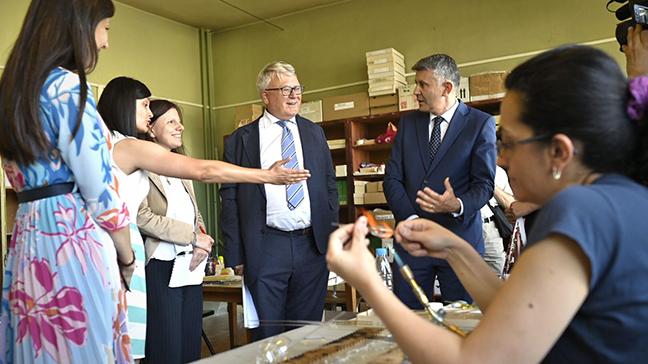
Nicolas Schmit, EU Commissioner for Jobs and Social Rights, who is in Bulgaria for the opening of the 10th European Forum on Social Entrepreneurship, visited two projects in Plovdiv that provide vital services to vulnerable communities. These projects emphasise the capacity of European Social Fund (ESF) funding to help communities face a wide array of social challenges.
The Commissioner’s first visit was to the ESF co-funded Early Childhood Development Centreproject, which provides a wide range of services to children in need. Based in Plovdiv, the project offers services dedicated to improving school readiness of children from vulnerable families and children with disabilities. It raises the overall well-being of children and builds a healthy family environment. Overall, the project has improved the situations of nearly 1400 children and their families.
Children are a particularly vulnerable group in Bulgaria, where more than 1 in 3 children is at risk of poverty or social exclusion. The adoption of the European Child Guarantee in 2021 has further helped Bulgaria to change this trend by implementing and promoting projects such as the ECDO and ensuring that every child has access to education and care, a healthy meal each day, healthcare, and housing.
The Commissioner then met staff from another ESF co-funded, Plovdiv-based project on Social Entrepreneurship Development that aims to advance the independent living of people with disabilities.
The project is part of a wider operation providing support to set up new enterprises, or expanding activities of already existing social enterprises and cooperatives of persons with disabilities. One of the aims of the project is to improve access to employment for jobless persons with disabilities. The project also contributes to the independent living and social inclusion of people with disabilities by providing psychological support and subsidised employment.
These projects are examples of the EU’s commitment to promote the social economy as a key driver for an inclusive and sustainable recovery, following the launch of the Action Plan for the Social Economy in December last year. Social economy organisations create and retain quality jobs, contribute to social and labour market inclusion, drive sustainable economic development and promote active citizen participation. Bulgaria has established a legal framework for the social economy, which helps to create and develop social enterprises.
The projects under operational programme ‘Human Resources Development’ are co-financed by the European Social Fund, offering concrete services to Bulgarian communities. Projects such as these provide vital support for the integration of vulnerable children and people with disabilities into wider Bulgarian society.
The 10th European Forum on Social Entrepreneurship continues on 21 June, followed by an exhibition of products and services offered by social and solidarity economy actors that takes place on 22-23 June.



